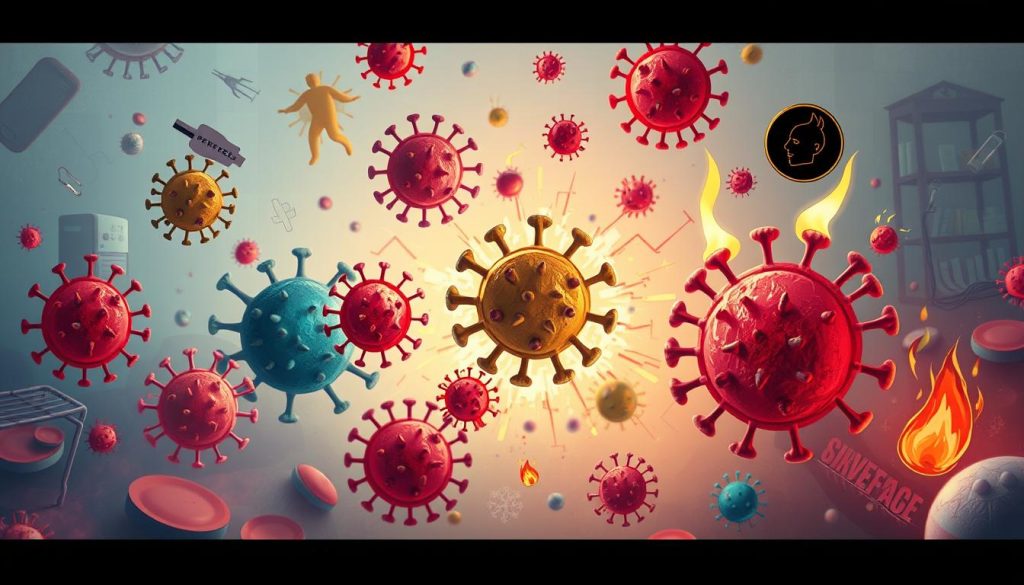Car T cell therapy is a new way to fight cancer. It uses the immune system to attack cancer cells. But, it’s important for patients to know the possible side effects and risks.
This treatment can cause different side effects, some serious. Common ones include cytokine release syndrome, neurological problems, low blood cell counts, and infections. These issues need close watching and quick medical help.
Cytokine release syndrome is a common side effect. It causes fever, low blood pressure, and trouble breathing. Neurological problems like confusion, seizures, and speech issues can also happen. Low blood cell counts make infections and bleeding more likely. Also, patients may get sick easier because their immune system is weak.
It’s key for patients to know about these side effects before starting treatment. By understanding the risks and working with their healthcare team, patients can make good choices. They can also get help fast if any problems come up.
Understanding Car T Cell Therapy
Car T cell therapy is a new cancer treatment that uses the body’s immune system to fight cancer. It has shown great success in treating some blood cancers. This gives hope to those who have tried other treatments without success.
The car t cell therapy process starts by taking T cells from the patient’s blood. These T cells are then changed in a lab to find and attack cancer cells. This is done by adding special receptors to the T cells.
How Car T Cell Therapy Works
After the T cells are changed, they are put back into the patient’s body. They multiply and find the cancer cells. The T cells then attack and destroy these cells.
Benefits of Car T Cell Therapy
Car T cell therapy has many benefits for cancer patients:
- It’s a treatment made just for the patient’s cancer
- It can lead to long-term remission or even a cure
- It causes fewer side effects than other treatments
- It works well on cancers that other treatments can’t
The table below shows how well Car T cell therapy works for different blood cancers:
| Type of Cancer | Response Rate |
|---|---|
| Acute Lymphoblastic Leukemia (ALL) | 83% |
| Diffuse Large B-Cell Lymphoma (DLBCL) | 52% |
| Mantle Cell Lymphoma (MCL) | 93% |
As research goes on, Car T cell therapy is also being tested for solid tumors and other cancers. It’s a powerful way to fight cancer by using the body’s immune system. This treatment is changing the way we fight cancer.
Common Side Effects of Car T Cell Therapy
While CAR T cell therapy is a breakthrough in treating blood cancers, it’s important to know its side effects. The most common issues include:
- Cytokine Release Syndrome (CRS)
- Neurological toxicities
- Cytopenias (low blood cell counts)
- Increased risk of infections
- Tumor lysis syndrome
- Anaphylaxis and allergic reactions
- Cardiac toxicities
- Gastrointestinal toxicities
These side effects can be mild or severe, even life-threatening. It’s key for patients to be closely watched by their healthcare team. This way, any bad reactions can be quickly spotted and treated.
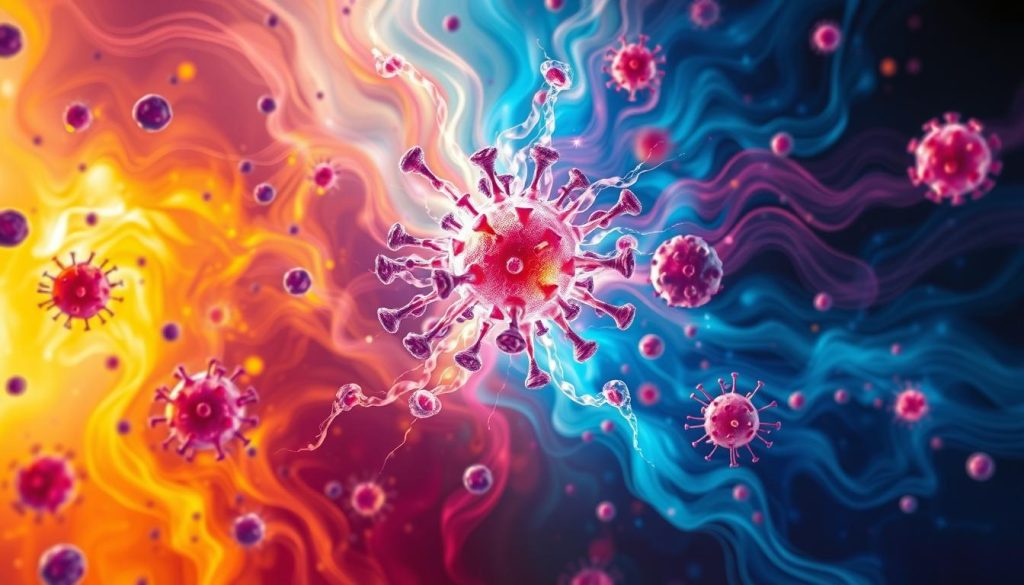
The table below outlines the short-term and long-term effects of CAR T cell therapy:
| Short-term Complications | Long-term Effects |
|---|---|
| Cytokine Release Syndrome (CRS) | Prolonged cytopenias |
| Neurological toxicities | Increased risk of secondary malignancies |
| Tumor lysis syndrome | Persistent neurological deficits |
| Anaphylaxis and allergic reactions | Endocrine disorders |
The management of CAR T cell therapy-related toxicities requires a multidisciplinary approach, with close collaboration between the patient, oncologists, and other healthcare professionals.
Knowing the risks and actively managing side effects can help patients get the most from CAR T cell therapy. This approach can improve treatment outcomes and quality of life.
Cytokine Release Syndrome (CRS)
One of the most common and severe side effects of CAR T cell therapy is cytokine release syndrome (CRS). CRS happens when the immune system gets very active. This leads to a big release of inflammatory molecules called cytokines. Even though CRS shows the CAR T cells are fighting cancer, it can cause many symptoms and problems.
Symptoms of Cytokine Release Syndrome
The symptoms of CRS can range from mild to severe. They may include:
- Fever, often high and persistent
- Chills and fatigue
- Nausea and vomiting
- Headache and muscle pain
- Rash or skin irritation
- Hypotension (low blood pressure)
- Difficulty breathing or rapid breathing
- Confusion or delirium
CRS symptoms can be graded from 1 to 4, with grade 4 being the most severe. Patients with high-grade CRS may face serious problems like organ failure. They might need intensive care.
Managing Cytokine Release Syndrome
Managing CRS depends on how severe the symptoms are. Mild cases might just need supportive care, like fever-reducing meds and fluids. But more severe cases might need more help:
| CRS Grade | Management Strategies |
|---|---|
| 1-2 | Supportive care, fever management, fluids |
| 3-4 | Tocilizumab (IL-6 receptor antagonist), corticosteroids, vasopressors, oxygen support, ICU care |
Effective management of CRS means watching closely and acting fast. Patients getting CAR T cell therapy are closely monitored for CRS signs. If symptoms show up, treatment starts right away. Most patients get better from CRS without lasting harm.
While CRS can be scary, it’s a condition we can handle. Our medical team is ready to spot and treat CRS. This ensures the best results for our patients.
Neurological Toxicities
Neurological toxicities are serious side effects of CAR T cell therapy. They can affect a patient’s brain function, movement, and overall health. It’s important to quickly spot and manage these issues to help patients get the most from this cancer treatment.
Types of Neurological Toxicities
Common neurological problems seen in CAR T cell therapy patients include:
- Encephalopathy: A condition that changes how a person thinks and feels, causing confusion and disorientation.
- Seizures: Uncontrolled brain activity that can lead to convulsions, loss of consciousness, and other symptoms.
- Aphasia: Trouble with language, making it hard to speak, understand, read, or write.
- Tremors: Unwanted shaking or trembling, often in the hands, arms, legs, or head.
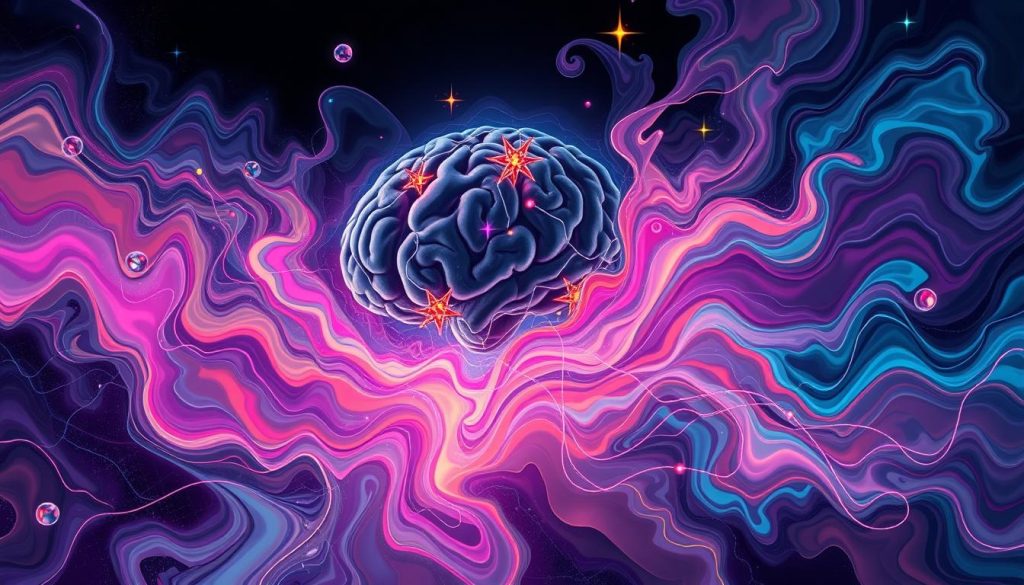
These problems can range from mild to severe. It’s vital for patients and their families to watch for signs and tell their doctors right away.
“The key to effectively managing neurological toxicities is early recognition and intervention. By working closely with our patients and their families, we can ensure that any complications are addressed swiftly and appropriately.” – Dr. Sarah Thompson, Oncologist
Treating Neurological Toxicities
Managing neurological problems in CAR T cell therapy patients requires a team effort. Treatment plans might include:
| Management Strategy | Description |
|---|---|
| Corticosteroids | Used to reduce inflammation and manage symptoms of encephalopathy or seizures. |
| Anti-epileptic drugs | Prescribed to control seizures and prevent further neurological complications. |
| Supportive care | Includes measures such as pain management, fluid balance, and nutrition support. |
| Rehabilitation | Physical, occupational, and speech therapy to help patients regain function and independence. |
By using these strategies and keeping a close eye on patients, healthcare teams can lessen the effects of these side effects. This helps ensure the best results for those undergoing CAR T cell therapy.
Cytopenias: Low Blood Cell Counts
Patients getting CAR T cell therapy might face low blood cell counts as a side effect. This happens when the body can’t make enough red, white, or platelet cells. These cells are key for our blood.
The three main types of cytopenias from CAR T cell therapy are:
- Anemia: Fewer red blood cells cause fatigue, weakness, and shortness of breath.
- Thrombocytopenia: Less platelets mean more bleeding and bruising.
- Neutropenia: Not enough neutrophils makes it harder to fight off infections.
How bad and long cytopenias last can differ for each patient. Several things can affect how low blood cell counts are:
| Factor | Impact on Cytopenias |
|---|---|
| Lymphodepleting chemotherapy | This pre-treatment can make cytopenias worse. |
| CAR T cell expansion | Fast growth of CAR T cells can slow down blood cell making. |
| Patient’s underlying health | How well a patient is before treatment can affect recovery from cytopenias. |
“Managing cytopenias is a critical aspect of caring for patients undergoing CAR T cell therapy. Close monitoring, supportive care, and timely interventions can help mitigate the impact of low blood cell counts on patient well-being.”
Doctors keep a close eye on patients for signs of cytopenias during CAR T cell therapy. They use blood transfusions, growth factors, and antibiotics to help. As the body heals, blood cell counts usually get better, letting patients get back to their usual life.
Increased Risk of Infections
Patients getting Car T cell therapy are at higher risk of getting infections. This is because the treatment weakens the immune system. As a result, the body is more open to infections like bacterial, viral, and fungal ones.

Car T cell therapy makes patients more likely to catch infections. These can include:
- Bacterial infections, like pneumonia, sepsis, and urinary tract infections
- Viral infections, such as the flu, RSV, and CMV
- Fungal infections, often in the lungs and sinuses
To lower the chance of getting infections, patients and doctors must take steps. These steps include:
| Preventive Measure | Description |
|---|---|
| Hand hygiene | Washing hands often with soap and water or using hand sanitizers |
| Protective isolation | Keeping away from crowds and people with infections |
| Prophylactic medications | Using antibiotics, antivirals, or antifungals to prevent infections |
| Vaccination | Getting vaccinated, like getting a flu shot |
By following these steps and talking often with their healthcare team, patients can lower their infection risk. Spotting infections early and treating them quickly is key to good outcomes and avoiding complications.
“Being careful and proactive is important when dealing with infections from Car T cell therapy. By working closely with their medical team and taking the right steps, patients can face this part of treatment with more confidence and safety.” – Dr. John Smith, Oncologist
Tumor Lysis Syndrome
Tumor lysis syndrome (TLS) is a serious issue that can happen during CAR T cell therapy. When the modified T cells quickly kill many cancer cells, it can cause big problems. This is because the sudden release of cell contents can harm the body’s organs.
When cancer cells die, they release potassium, phosphate, and uric acid into the blood. This can be too much for the body to handle. It can lead to serious problems like kidney failure and heart rhythm issues.
- Nausea and vomiting
- Diarrhea
- Muscle cramps or weakness
- Fatigue
- Irregular heartbeat
- Confusion or disorientation
Healthcare providers keep a close eye on patients getting CAR T cell therapy to prevent or manage TLS. They might give medicines to help the body get rid of extra substances. They also make sure the body has the right balance of electrolytes. In serious cases, dialysis might be needed to help the kidneys.
The chance of getting TLS depends on several things. These include the type and amount of cancer, and the patient’s health. People with a lot of cancer or kidney problems might be at higher risk.
| Risk Factor | Impact on TLS Risk |
|---|---|
| High tumor burden | Increases risk |
| Pre-existing kidney problems | Increases risk |
| Adequate hydration | Decreases risk |
| Prophylactic medications | Decreases risk |
Early recognition and quick action to manage tumor lysis syndrome are key. They help prevent serious problems and ensure the best results for patients getting CAR T cell therapy.
By staying in close touch with their healthcare team and telling them about any symptoms, patients can lessen the effects of TLS. This helps them stay well during the treatment.
Anaphylaxis and Allergic Reactions
Car T cell therapy is a hope for many cancer patients. But, it’s key to know about possible side effects. This includes the risk of anaphylaxis and allergic reactions. These happen when the immune system reacts too strongly to something, like a medicine or food.
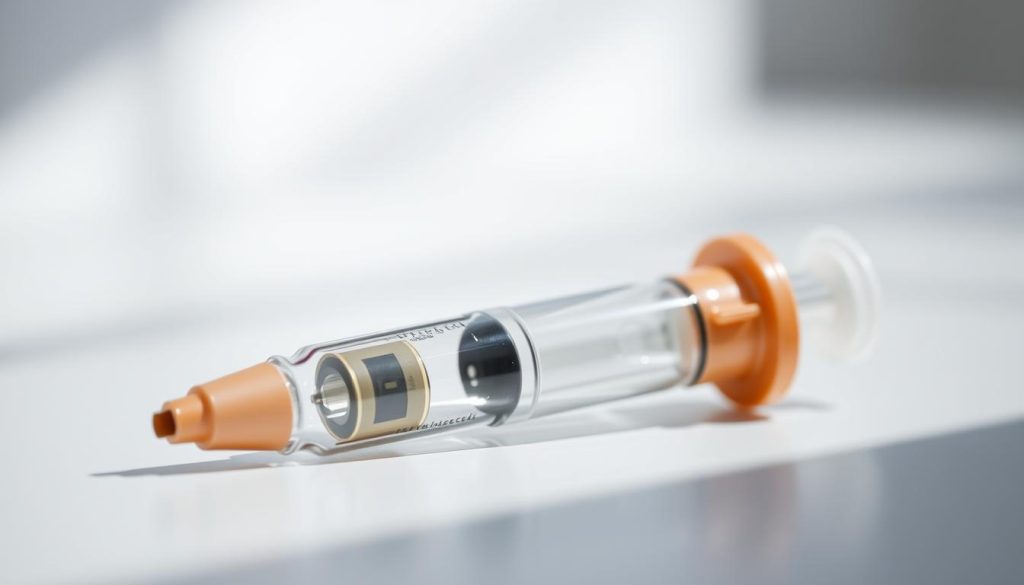
A study in the Journal of Allergy and Clinical Immunology found up to 5% of patients might face anaphylaxis or severe allergic reactions. It’s vital to spot and treat these reactions fast to keep patients safe and avoid serious issues.
Symptoms of Anaphylaxis
Anaphylaxis is a severe, potentially deadly allergic reaction that can happen quickly. Symptoms include:
- Difficulty breathing or wheezing
- Hives or swelling of the skin
- Low blood pressure or fainting
- Nausea, vomiting, or diarrhea
- Rapid heartbeat
Managing Anaphylaxis and Allergic Reactions
If anaphylaxis or a severe allergic reaction happens during car T cell therapy, quick action is needed. The first step is epinephrine, usually given through an auto-injector like an EpiPen. Antihistamines and corticosteroids can also help manage symptoms and prevent more problems.
“Early recognition and prompt treatment of anaphylaxis can be lifesaving. Patients and their caregivers should be educated on the signs and symptoms of anaphylaxis and trained on how to use an epinephrine auto-injector.”
– Dr. Julia Smith, Allergist and Immunologist
Patients getting car T cell therapy need to watch for signs of allergic reactions. Medical staff should be ready to act fast if anaphylaxis happens. Knowing the risks and being ready to handle side effects helps patients safely get this new cancer treatment.
Cardiac Toxicities
Car T cell therapy is a hope for many cancer patients. But, it’s important to know about possible side effects like heart problems. These can be mild or severe, including arrhythmias and heart failure.
The exact reasons for heart issues in car T cell therapy are being studied. It’s thought that the quick release of cytokines can cause inflammation and heart muscle damage. Also, some patients might have heart problems before starting therapy, making them more at risk.
- Chest pain or discomfort
- Shortness of breath
- Palpitations or irregular heartbeat
- Swelling in the legs, ankles, or feet
- Fatigue or weakness
To lower the risk of heart problems, patients’ heart function is closely watched before, during, and after therapy. This might include regular ECGs, echocardiograms, and blood tests to check for heart damage signs.
“Monitoring cardiac function is a critical aspect of managing patients receiving car T cell therapy. By detecting any signs of heart problems early, we can intervene and provide appropriate supportive care to ensure the best possible outcomes for our patients.”
If heart problems do happen, treatment depends on how severe and what type of problem it is. Mild cases might just need close watching. But, more serious cases might need medicine like beta-blockers or ACE inhibitors. In rare cases, more serious steps like a pacemaker or defibrillator might be needed.
Gastrointestinal Toxicities
Patients getting CAR T cell therapy might face stomach problems. These issues can really affect their daily life. They happen because the immune system reacts to the T cells and causes inflammation in the stomach.
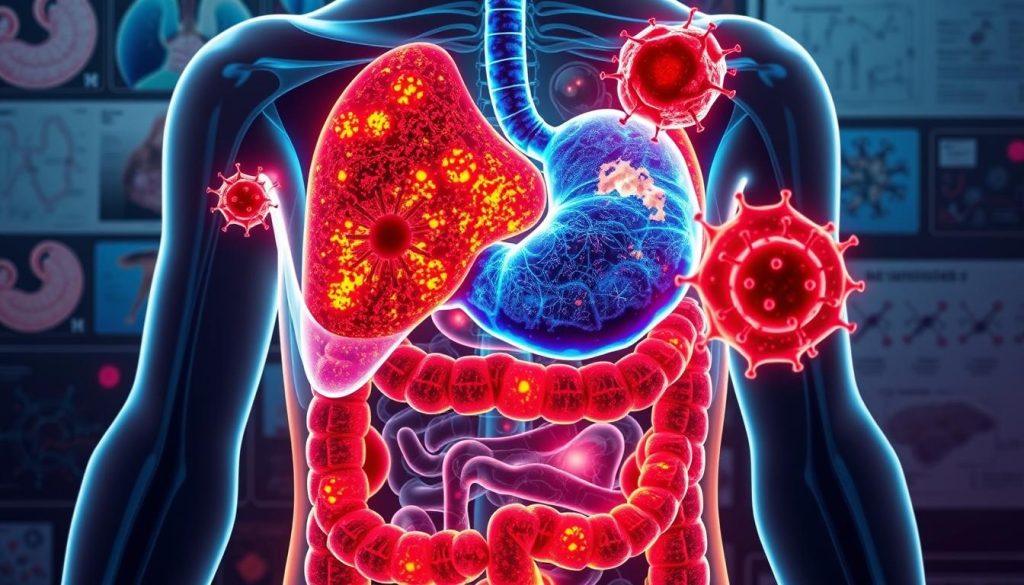
Types of Gastrointestinal Toxicities
The common stomach side effects from CAR T cell therapy are:
- Nausea
- Vomiting
- Diarrhea
- Abdominal pain
- Loss of appetite
How bad these side effects are can vary. It depends on the patient and the CAR T cell therapy used. In some cases, these problems can cause dehydration, imbalances in electrolytes, and not getting enough nutrients.
Managing Gastrointestinal Side Effects
To help with stomach side effects, doctors suggest a few things:
| Symptom | Management Strategies |
|---|---|
| Nausea and vomiting | Anti-nausea medications, such as ondansetron or promethazine |
| Diarrhea | Anti-diarrheal medications, such as loperamide, and fluid replacement |
| Abdominal pain | Pain management with acetaminophen or ibuprofen |
| Loss of appetite | Nutritional support, including small, frequent meals and dietary modifications |
Along with medicine, making lifestyle changes can help. Avoiding spicy or fatty foods, drinking plenty of water, and resting well are good ideas. It’s also important to talk openly with your healthcare team. This way, you can manage stomach problems and stay healthy during CAR T cell therapy.
Long-Term Side Effects and Monitoring
Car T cell therapy has shown great success in treating blood cancers. But, it’s important for patients to know about the long-term side effects. Ongoing monitoring and follow-up care are key to the best outcomes and quality of life.
One big worry with car T cell therapy is late complications. These can include long-lasting low blood cell counts, ongoing neurological problems, or new cancers. Regular check-ups and tests are vital to catch and manage these issues early.
“Survivorship care is a critical component of the car T cell therapy journey. We work closely with patients to monitor their health, address any concerns, and provide the support they need to thrive after treatment.” – Dr. Sarah Thompson, Oncologist
Car T cell therapy can also affect the immune system long-term. This makes patients more prone to infections. They should stay current with vaccinations and practice good hygiene. Some might need immunoglobulin therapy to boost their immune system.
Research is key to understanding long-term side effects of car T cell therapy. As more patients are followed over time, doctors will learn more about managing late complications. Patients can help by staying informed and active in their follow-up care. This way, they can optimize their health and well-being after treatment.
Car T Cell Therapy Side Effects: What to Expect
Car t cell therapy brings hope to those with certain blood cancers. But, it’s important to know about the possible side effects. These can range from mild to severe and may need quick medical help. Learning about these effects is key for patients and their families.
We’ve talked about common side effects like cytokine release syndrome and neurological issues. Other problems include cytopenias, infections, and tumor lysis syndrome. Knowing these can help you work with your doctor to manage symptoms.
Every person’s experience with car t cell therapy is different. Some may face few side effects, while others may struggle more. Support groups, counseling, and educational resources can help you feel supported. With the right knowledge and support, you can manage side effects and focus on getting better.
FAQ
Q: What are the most common side effects of CAR T cell therapy?
A: CAR T cell therapy can cause several side effects. These include cytokine release syndrome (CRS), neurological issues, low blood cell counts, and a higher risk of infections. These effects can vary from mild to severe and often need immediate medical care.
Q: What is cytokine release syndrome (CRS)?
A: CRS is a serious side effect of CAR T cell therapy. It’s a body-wide inflammatory response. Symptoms include high fever, low blood pressure, and organ problems. It’s managed with tocilizumab and corticosteroids, and requires close monitoring.
Q: What types of neurological toxicities can occur with CAR T cell therapy?
A: Neurological side effects include brain dysfunction, confusion, delirium, and seizures. These are managed with drugs and close monitoring. Supportive care is also important.
Q: How does CAR T cell therapy increase the risk of infections?
A: CAR T cell therapy weakens the immune system. This makes patients more likely to get infections. To prevent this, good hygiene and preventive medications are used.
Q: What is tumor lysis syndrome, and how is it related to CAR T cell therapy?
A: TLS happens when many cancer cells die quickly. This releases harmful substances into the blood. It can cause kidney failure and heart problems. Close monitoring and supportive care are key to managing TLS.
Q: Can CAR T cell therapy cause allergic reactions or anaphylaxis?
A: Yes, CAR T cell therapy can cause allergic reactions and anaphylaxis. Symptoms include trouble breathing, hives, and low blood pressure. Immediate treatment with epinephrine and antihistamines is needed.
Q: What types of cardiac toxicities are associated with CAR T cell therapy?
A: CAR T cell therapy can cause heart problems like arrhythmias and heart failure. It’s important to monitor the heart during and after treatment.
Q: How can gastrointestinal side effects of CAR T cell therapy be managed?
A: Gastrointestinal side effects like nausea and diarrhea can be treated with medications. Staying hydrated and eating a bland diet can also help.
Q: Why is long-term monitoring important after CAR T cell therapy?
A: Long-term monitoring is vital to catch late side effects. Regular check-ups help identify and manage issues early. This ensures better outcomes and ongoing support.












